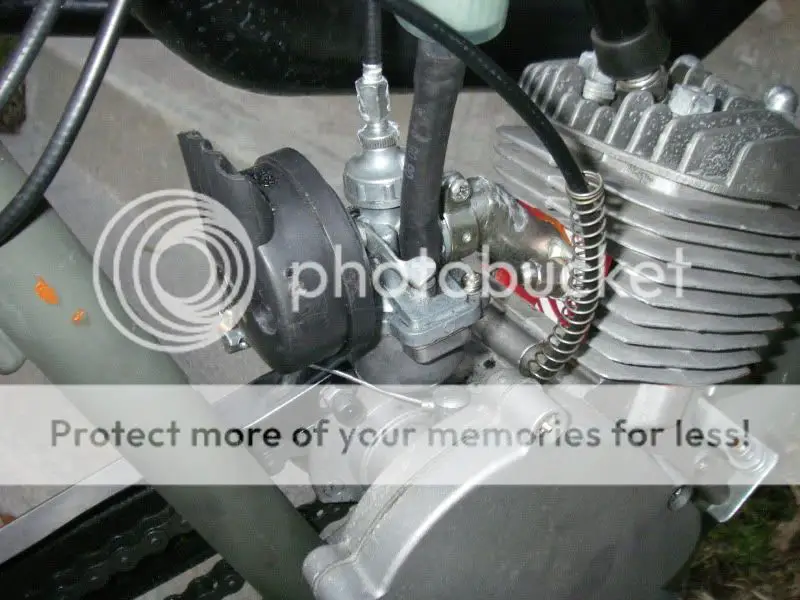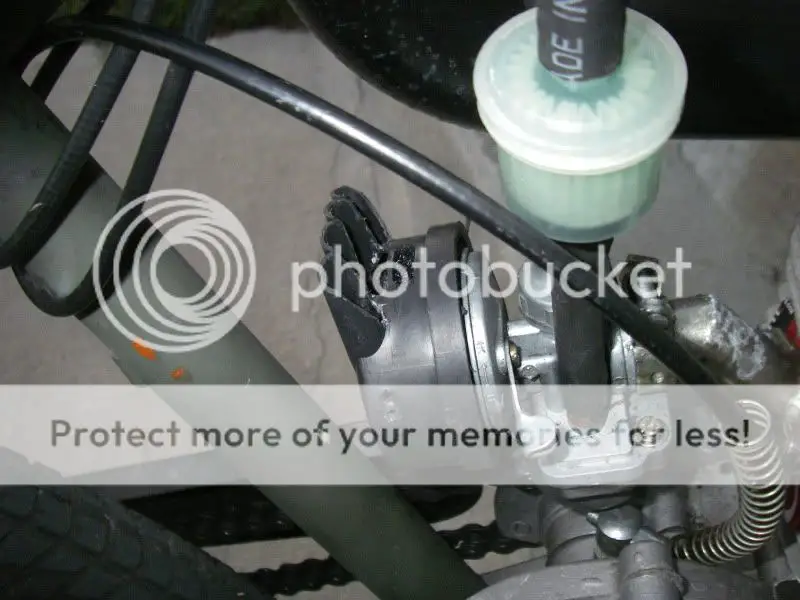So here's what I've put together so far,
Just a regular ol' bike for commuting.
The Whole Bike

Improvised reed Valve: (read: look at the red thing)

Easy Air Cleaner Mod that Promotes easier breathing:

I use this thing to commute to class every day here at school, its fairly hilly, and she does okay.
I've got 192 miles on the odo so far, and shes breaking in well, I'd say. Not too fast, but keeps up with traffic. My view is that bikes like these are not designed to sustain speeds this high, so I check the bearings and repack every month.
Info on the Bike:
Schwinn Skyliner, Cantilever Brakes, front spring suspension 26x1.91 tires
66cc kit from daemon bikes
stock carb, stock intake
Exhaust Modified for easier flow
36t cog
Improvised reed valve
ports cleaned and resized, piston skirt relieved to open the intake port 100% at TDC
Compression: 150 psi
Spark: Bosch Platinum 2x
Mix : 32:1
0-30 : 10s
Cruising speed, mid throttle : 30mph
top speed: 41mph
max speed seen 45mph (Common sense limited)
The Reed Valve
If anyone is interested about the reed valve, here's a short explanation:
Back in the day I used to work on two strokes a lot for the various small craft I had for fishing and putting about. All of these had reed valves. So when I broke down the kit I bought for my bike my first thought was, "Why no reed valve?" So I set off on a grand adventure to build one on the cheap with what I had in my apartment.
The first Iteration:
The first attempt was a traditional flexible flap type design, cut from aluminum using the intake pipe as a pattern, ideally, it would flap shut against the intake, as it is smaller than the port on the motor, and could flap freely in. This quickly developed stress fractures and failed. (as aluminum does.)
Second Iteration:
High temperature Plastic.
This worked, but I didn't like it because. (thats pretty much it)
Third Iteration:
The Flapper hinge.
Basically, using aluminum from a soda can, and a stainless steel pin, I created a flap hinge in the same shape as the first and second iterations. This Failed for a simple reason: It flapped all the way open and stuck that way, pressures holding up against the roof of the intake port.
The fix was simple, a wedge shaped cut of aluminum that limited the range of the open cycle of the flap. Problem solved. This valve has been running for the better part of 80 miles.
Will it fail? yes.
When will it fail?
lets find out.
How do I know it is working?
There is no more sticky oil goop in the air cleaning sponge, and a faint ticking noise at less noisy RPMs. Let her flap on to eternity.
Any neat ideas and questions more than welcome. This site has been a great idea sounding board.
-Funderb
Just a regular ol' bike for commuting.
The Whole Bike

Improvised reed Valve: (read: look at the red thing)

Easy Air Cleaner Mod that Promotes easier breathing:

I use this thing to commute to class every day here at school, its fairly hilly, and she does okay.
I've got 192 miles on the odo so far, and shes breaking in well, I'd say. Not too fast, but keeps up with traffic. My view is that bikes like these are not designed to sustain speeds this high, so I check the bearings and repack every month.
Info on the Bike:
Schwinn Skyliner, Cantilever Brakes, front spring suspension 26x1.91 tires
66cc kit from daemon bikes
stock carb, stock intake
Exhaust Modified for easier flow
36t cog
Improvised reed valve
ports cleaned and resized, piston skirt relieved to open the intake port 100% at TDC
Compression: 150 psi
Spark: Bosch Platinum 2x
Mix : 32:1
0-30 : 10s
Cruising speed, mid throttle : 30mph
top speed: 41mph
max speed seen 45mph (Common sense limited)
The Reed Valve
If anyone is interested about the reed valve, here's a short explanation:
Back in the day I used to work on two strokes a lot for the various small craft I had for fishing and putting about. All of these had reed valves. So when I broke down the kit I bought for my bike my first thought was, "Why no reed valve?" So I set off on a grand adventure to build one on the cheap with what I had in my apartment.
The first Iteration:
The first attempt was a traditional flexible flap type design, cut from aluminum using the intake pipe as a pattern, ideally, it would flap shut against the intake, as it is smaller than the port on the motor, and could flap freely in. This quickly developed stress fractures and failed. (as aluminum does.)
Second Iteration:
High temperature Plastic.
This worked, but I didn't like it because. (thats pretty much it)
Third Iteration:
The Flapper hinge.
Basically, using aluminum from a soda can, and a stainless steel pin, I created a flap hinge in the same shape as the first and second iterations. This Failed for a simple reason: It flapped all the way open and stuck that way, pressures holding up against the roof of the intake port.
The fix was simple, a wedge shaped cut of aluminum that limited the range of the open cycle of the flap. Problem solved. This valve has been running for the better part of 80 miles.
Will it fail? yes.
When will it fail?
lets find out.
How do I know it is working?
There is no more sticky oil goop in the air cleaning sponge, and a faint ticking noise at less noisy RPMs. Let her flap on to eternity.
Any neat ideas and questions more than welcome. This site has been a great idea sounding board.
-Funderb

